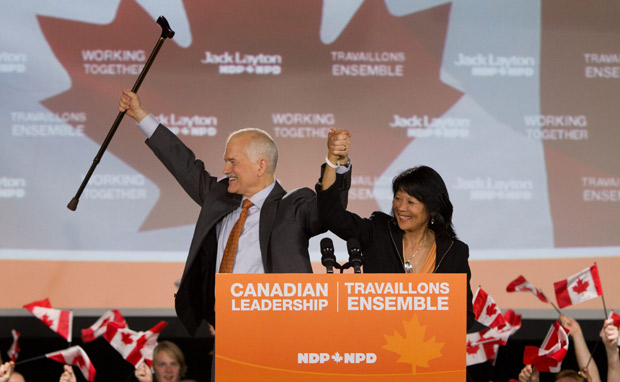MONTREAL – After nearly a generation of unbroken dominance in Quebec, the Bloc Quebecois was almost erased from the province’s political map on Monday night.
Its collapse at the hands of the NDP has cast a shadow over the party’s future, but it is unlikely to spell the end of the sovereignty movement itself.
"I am leaving, but others will follow up until Quebec becomes a country," Bloc Quebecois Leader Gilles Duceppe said as he announced his resignation.
While the Bloc must now find a new leader and begin a long rebuilding process, its provincial counterpart, the Parti Quebecois, is in a much better position.
It is the Official Opposition in Quebec City and has consistently polled higher than the governing Liberals in recent months.
It will take up the task of keeping sovereignty high on Quebec’s political agenda.
A majority Conservative government with a right-leaning agenda may very well lead to increased support for sovereignty.
Quebecers are no strangers to rallying around the PQ when faced with a strong federalist government.
In the short term, however, Quebecers will be speaking with a different voice at the federal level for the first time in 18 years.
The Bloc had won a majority of Quebec’s 75 seats in every federal election since 1993.
Its defeat on Monday night was as complete as it was embarrassing.
Not only did the NDP win 58 seats – more than the Bloc has ever managed – it also forced Bloc Leader Gilles Duceppe to step down.
To make matters worse, the Bloc’s four seats mean it will lose official party status in the House of Commons, which will complicate its efforts to rebuild.
The party has also lost the resources and staff that come with that, its leader, its likely leadership successors, its face time in the Commons and, next, its vote-subsidy money.
Quebec independence has lost 45 field marshals who would have used research resources, staff, travel budgets, House of Commons flyers, and their own platform as elected officials to help elect the PQ and push for a referendum.
"As always, voters have the final word," Duceppe said. "They expressed a profound desire for change."
The Bloc’s demise is all the more stunning given that its losses were largely to party that has never held more than one seat in Quebec.
It campaigned hard in the last week of the election to rally its sovereigntist base, hoping to forestall a drubbing at the hands of the NDP.
But even the Bloc’s well-oiled election machine proved unable to head off the unstoppable support for the NDP.
It was, for instance, strong enough to carry Ruth Ellen Brosseau, who drew flak for taking a family vacation to Las Vegas during the campaign, to a landslide victory in Berthier-Maskinonge.
The mastermind of the NDP’s rise in Quebec, deputy leader Thomas Mulcair, characterized his party’s impressive showing as a rejection of constitutional bickering.
"We see the melting away of the constitutional divide, which is a rather artificial way of dividing in politics," Mulcair told a near delirious crowd in Montreal.
"We’re going back to a more classic left-right division."
The Bloc was far from the only victim of the NDP’s success.
Former Conservative cabinet minister Lawrence Cannon lost his seat in Pontiac to the NDP’s Mathieu Ravignat.
The Tory stronghold around Quebec City, once thought vital to the party’s hopes for a majority, also failed to withstand the NDP onslaught.
Their fortunes in the area were already in jeopardy thanks to its decision not to fund a new NHL-style arena in the city.
On Monday, both Josee Verner and Sylvie Boucher – the two Conservatives most closely associated with the arena question – fell to NDP candidates.
Maxime Bernier survived for the Tories, as did Christian Paradis, Prime Minister Stephen Harper’s Quebec lieutenant. The party won six in all.
The once-proud Liberals were also decimated, electing seven MPs. Those left standing included Justin Trudeau, Stephane Dion and former justice minister Irwin Cotler.
Other ridings that had been Liberal fortresses could not withstand the NDP juggernaut.
LaSalle-Emard, ex-prime minister Paul Martin’s old riding, went orange. So did such Montreal ridings as Notre-Dame-de-Grace-Lachine and Pierrefonds-Dollard.
The NDP’s growth could be attributed to two main factors – a leader popular with Quebecers and a pugnacious deputy leader who has worked tirelessly to turn the party from a curiosity to a viable option.
Mulcair, a former provincial cabinet minister, delivered a surprising blow to the Liberals in 2007 when he grabbed their longtime stronghold of Outremont in a byelection.
That was to become a beachhead. Mulcair seemingly never turns down a media appearance, and that visibility has paid dividends. The party was polling in the low 20s going into the election.
But force of character alone couldn’t explain the scale of the NDP’s sudden surge.
Under Mulcair’s tutelage, the party crafted Quebec friendly policies, such as expanding the province’s language laws to federally regulated institutions.
The party has also mused about creating "winning conditions" that would allow the province to finally sign the Constitution.
"The NDP listened and understood your deep desire to do things differently in Ottawa, (to) put workers and their families at the forefront," Mulcair said Monday night.








Comments